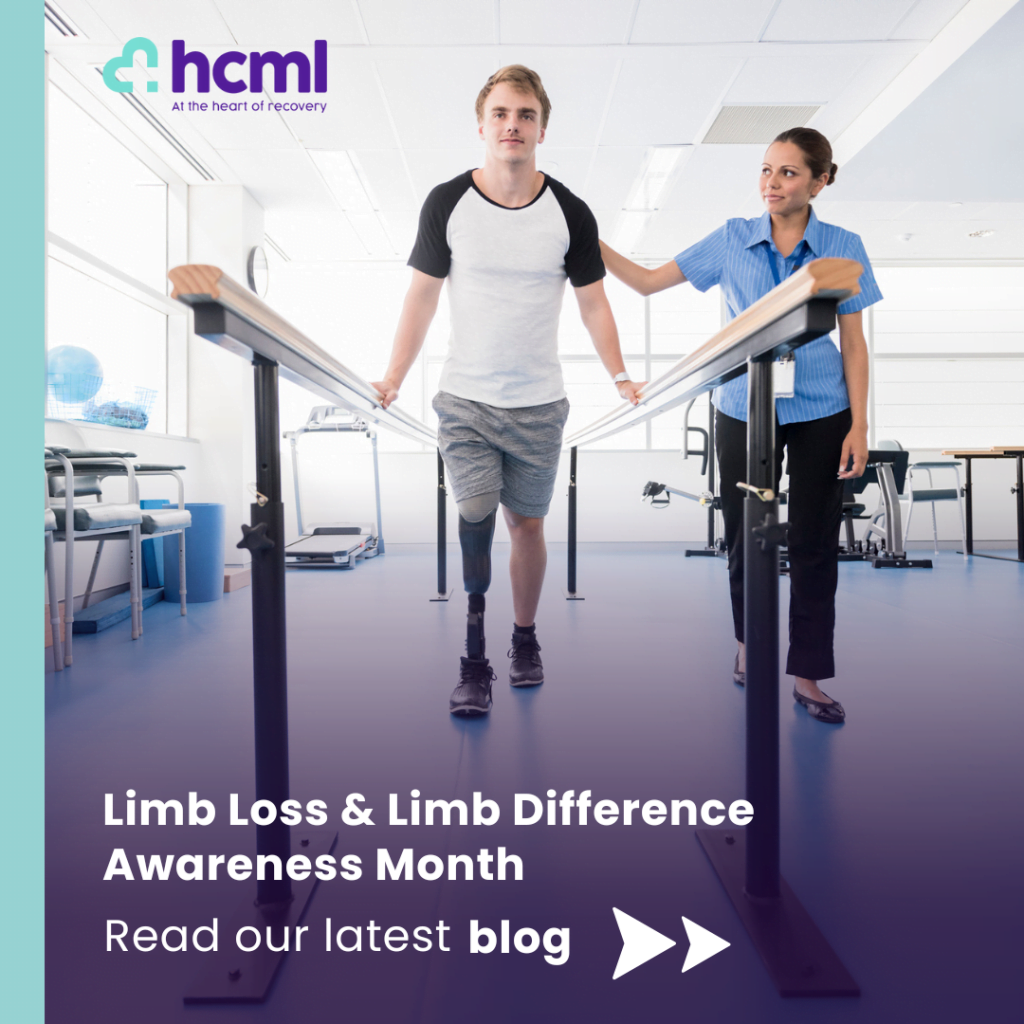
Q&A with Jason Chidwick, Clinical Lead for Amputee Services
This month is Limb Loss/Limb Difference Awareness Month. It’s all about raising awareness and empowering those who are living with this kind of disability. For those who have experienced amputation as a result of personal injury, case management services are vital to their rehabilitation and enabling them to maximise their independence and achieve their own goals.
Jason Chidwick is Clinical Lead for HCML’s amputee rehabilitation services, and here he explains a bit more about the impact of case management in amputee cases.
Q: What backgrounds do the team of HCML Rehabilitation Case Managers (RCMs) have and how does this influence how they work with amputees?
The team have a variety of backgrounds, from sport rehabilitation, nursing, physiotherapy and occupational therapy. Their backgrounds will have some influence on how each case is managed depending on experience and specialist areas. For example, an occupational therapist (OT) will have a very good understanding of how equipment aids promote independence whereas someone with a sports rehab background will have experience in understanding how function is affected and what impact this has on outdoor mobility etc.
It can be beneficial if the RCM has worked in the NHS previously as they will have an understanding of NHS processes, effective ways of communicating with the NHS treating team, or have existing contacts that can help.
However, all RCMs have a rounded approach – ongoing training and case clinics enable the team to share expertise for the benefit of their clients.
Q: People are often referred to HCML quite some time after the initial trauma, and mostly when they’ve already been through an amputation procedure. How do the team begin to rebuild the person’s confidence in rehabilitation services and what can be achieved?
We see people within varying timescales since amputation; from a matter of weeks to years. Some clients undergo amputations during case management, for example, where this is elective. Clients can certainly be traumatised and significantly low on confidence when we see them, and this is a huge factor to consider and address.
Early access to psychotherapy is imperative in order to provide the client with a specialist platform to air their views and receive guidance specifically around how to address these and overcome the potential anger, anxiety, depression and other symptoms they may be experiencing.
It can also be addressed by physios and OTs etc., who can assist with promoting independence, which in turn positively effects the client’s whole outlook and psychological wellbeing. Trust is a massive factor in all that we do; the client ultimately needs to trust the RCM is doing the right thing by them and has the experience / know how to guide them through their rehabilitation journey following trauma. This comes with experience, being empathetic and explaining things carefully and thoroughly to the client and their families.
Q: What are some examples of the goals people want to achieve in their recovery?
To complete their activities of daily living independently / mobilise without a crutch or walking stick / return to employment / return to driving or riding a bike / return to various sports (running / swimming / cycling etc.) / climb mountains (Ben Nevis etc.) / skiing / become a Paralympian is a popular one!
Q: How does the team effectively coordinate private and statutory services to get the best outcomes for their clients?
We liaise with the NHS as much as possible to try get as much info as possible in terms of the plan of action, timeframes, goals and what provision is available. If further intervention is needed for the client to reach their long and short term goals, we look at private options to assist with this. We always encourage clients to continue with the treatment and support from the NHS as it is important that they have an NHS prosthesis, even if it is simply used as a back up leg. It also maintains the relationship with the NHS as they might need their help in the years to come.
Sometimes the NHS staff are involved in MDT meetings, however this is quite rare given the lack of time the NHS staff have available. Where there are a number of specialists involved, regular MDT meetings take place virtually to ensure everyone is aware of what is happening, everyone is working towards the same pre-set goals and if there are any issues, these can be addressed immediately.
Q: How do adults and children differ in their attitudes and ambitions for rehabilitation and recovery?
Children generally tend to just get on with things and adapt to their situation a bit easier and quicker than adults. I think that children are not as concerned about how others perceive them, and the psychological impact could therefore be less compared to adults. Children tend to progress really well and quicker than adults, potentially because they have fewer external stressors compared to adults (employment, finances, relationships etc.).
Q: What aspects of limb loss/limb difference do you think are important to highlight when it comes to increasing awareness?
I think any increased awareness of limb loss and limb difference is great and for people to see the positive outcomes that can happen from such a catastrophic event is imperative. It can show that even though something horrific has happened, life can go on and does go on, and the outcomes can be extremely positive and pro-active. Some amputees are greater functioning than able-bodied individuals.











